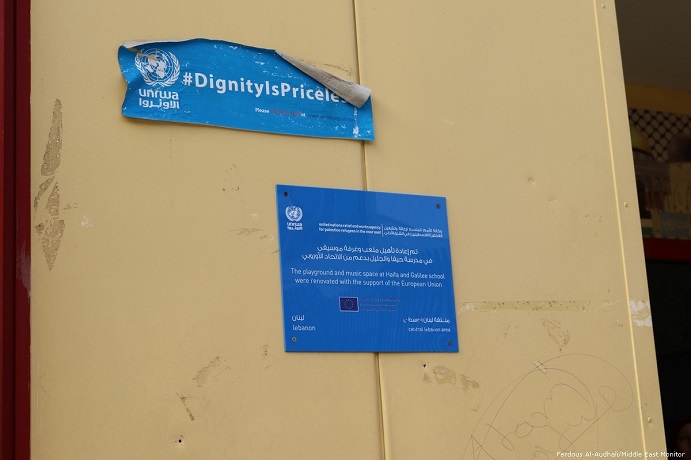Adnan Abu Amer
Middle East Monitor / March 3, 2020
There is a rising tension between the UNRWA Staff Union and the administration, as the last two weeks have witnessed, with waves of strikes and protests being held following the UN agency’s decision to downsize and reduce its services. This includes cancelling all privileges granted to Palestinian employees, stopping the work of the emergency program, laying off around 500 workers, stopping contact-based work, and opening the door to retirement for those who have served 15 years in their position.
UNRWA is doing this under the pretext of a financial crisis that prompted it to take these measures, even though its decision to downsize has a bigger political aspect than financial, because the sudden expansion of the area of it is downsizing is linked to the “deal of the century”, which stipulates ending its work and eliminating the refugee status of the Palestinians.
UNRWA’s repeated threats to limit its operations began two years ago due to the financial crisis it was facing.
The UNRWA administration claims that the deficit carried over from last year amounts to nearly $80 million, the lowest in several years. However, the agency’s headquarters, located in Jordan, informed the administrations of the five regions to reduce the budget by ten per cent.
According to information from within UNRWA, Gaza’s share of the cut will be $22 million, which prompted the threat of stopping some programs, merging some schools and cancelling the request for any new vacancies.
UNRWA has also stopped receiving any requests for food assistance, or adding any new births to the ration cards. Moreover, no replacements can be hired to work in the place of employees who are absent from work. This is in coincidence with imposing new restrictions on staff leave and the halting of payments of currency conversion differences to employees.
These actions in Gaza coincide with others in Lebanon and Jordan. UNRWA’s threats are concerning to the host countries, which have called for an urgent meeting of the Agency’s Advisory Council in Amman, to study the repercussions of the crisis. These actions occur in light of fears of gradually eliminating URNWA as donor countries stop fulfilling their financial pledges.
Palestinian refugees believe that UNRWA can only continue to serve them if it cuts or reduces its services. This requires real and urgent intervention by the international community and donors to rescue UNRWA and fulfil obligations made as part of the three-year mandate resolution in the United Nations General Assembly. This must be covered by a financial safety net.
In the Gaza Strip alone, 70 per cent of families are threatened with food insecurity. We can only imagine the situation of Palestinian refugees if UNRWA cuts its services and the relief, health and educational services it provides.
The Palestinians refuse to link the financial crisis faced by UNRWA to the reduction in services, because in the event of a budget decrease the United Nations is supposed to cover this deficit.
Continued cuts may lead to negative and very dangerous repercussions on the social and economic situation of the Palestinian refugees, wherever they are. Meanwhile, providing the required budget and meeting the needs of the refugees is considered protection for the Palestinian refugees, and will not cause a rise in poverty and unemployment. The danger of these cuts lies in refugees looking for difficult choices and opens the door to new waves of migration.
There are fears that more negative impacts on the services provided by the UNRWA to refugees, given the increasing numbers of refugees, patients and students, will lead to an inevitable explosion if these reductions are implemented.
The Palestinians are circulating information that confirms that there is a state of harmony between UNRWA’s policies and laws, and the deal of the century, especially with regard to the education sector for refugees. The most important measures taken is not writing the words “refugees” and “Palestine” in English on school signs or the UNRWA logo on student certificates, replacing the Palestinian national anthem with another song at the beginning of the day, and removing historical maps of Palestine from classrooms.
The Palestinian refugee issue is a major part of the deal of the century, as the clauses regarding the solution, in US President Donald Trump’s view, focused on ending the right of return, denying refugees any financial compensation, and resettlement in the Arab countries where they reside. These clauses sparked outrage among Palestinian refugees, and the past weeks have witnessed marches and sit-ins in the Palestinian camps condemning the deal, which ignores their suffering over the past 70 years.
The deal includes three options for Palestinian refugees who are looking for a permanent place of residence. The first option is absorption within Palestine, with this option subject to restrictions. The second is integration into the host countries that they are currently residing in, subject to the host country’s approval, and the third is accepting 5,000 refugees annually over a period of ten years, totalling 50,000 refugees, in the OIC countries that agree to participate in the Palestinian refugee resettlement process.
It is only natural for the Palestinians to consider with great gravity the solutions offered by the deal of the century to the Palestinian refugees, because they are in direct contradiction with UN resolutions, beginning with Resolution 194. They also violate the simplest international definitions of the Palestinian refugee, and illegally eliminate a large number of refugees.
Adnan Abu Amer is a Palestinian academic













